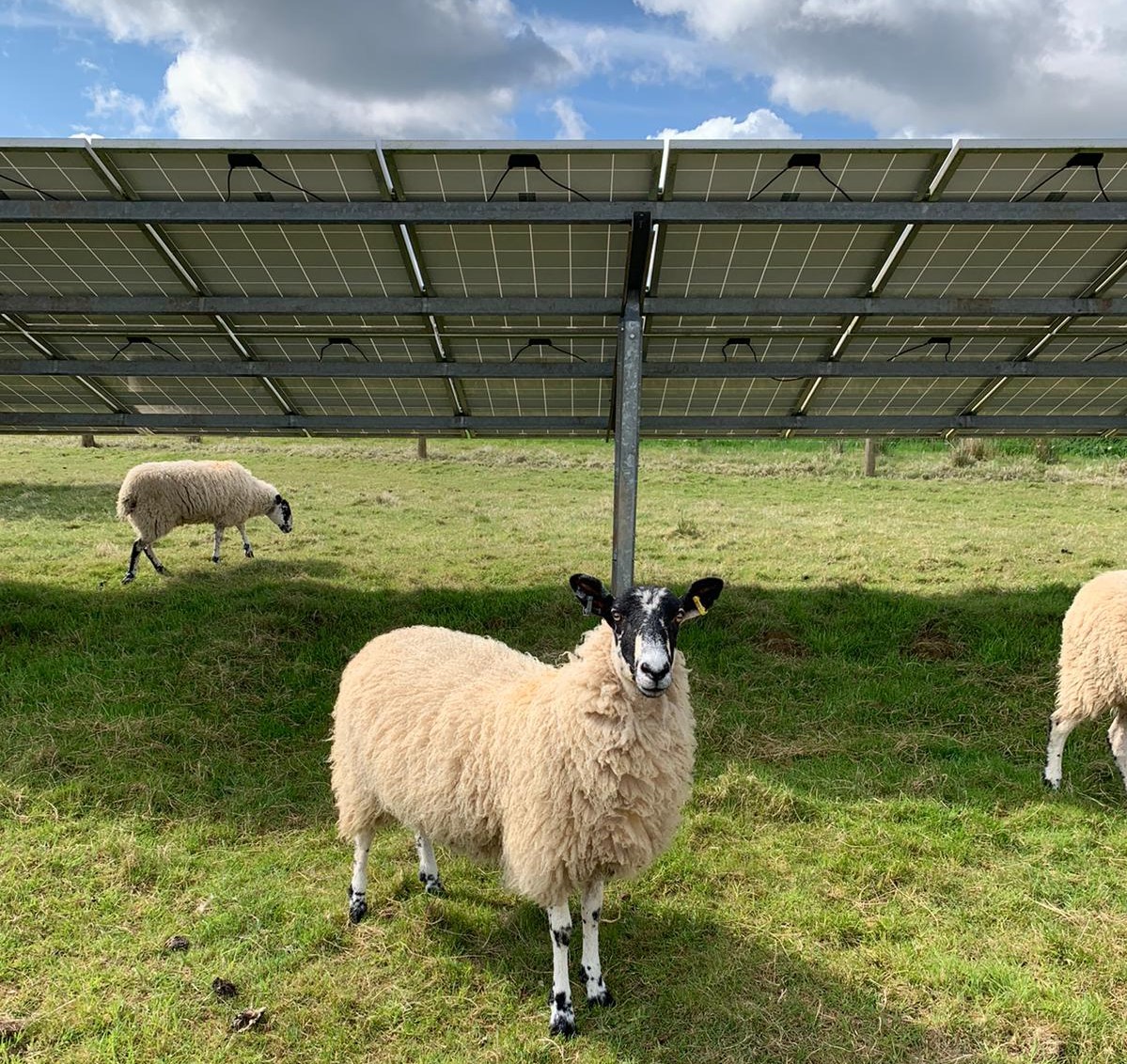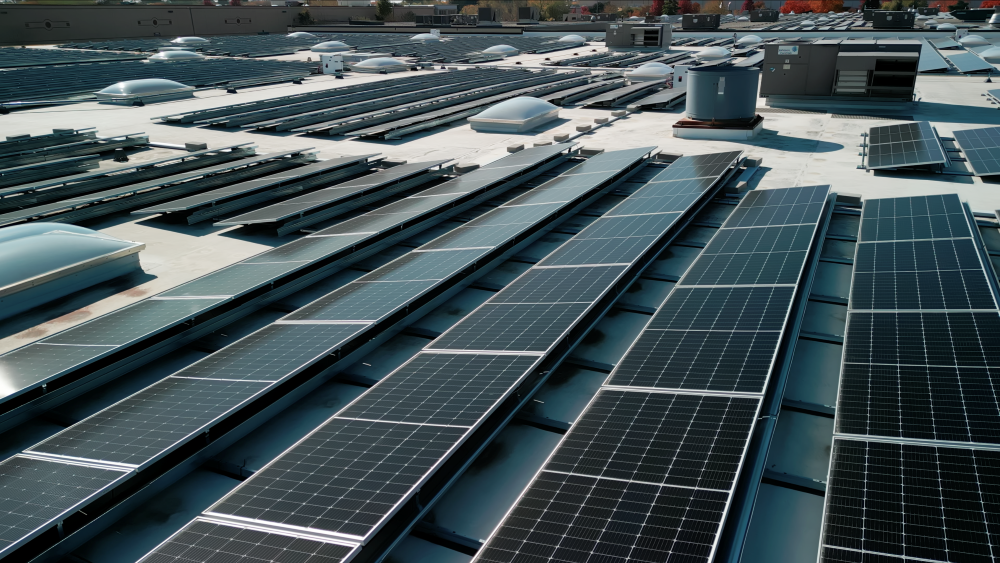
The world is increasingly looking for sustainable and cyclical business practices that benefit the planet and all the creatures that live on it; sheep, otherwise known as solar sheep, play an important part in the maintenance of land around our ground-mounted solar panels and the performance of renewable energy assets.
The panels turning sunlight into renewable energy, but long grass can cause shading on the panels and reduce their efficiency. The underperformance of one panel will affect the productivity of all the other panels surrounding it as they are connected in a series. It is essential to keep the grass around the solar panels trimmed, but using traditional diesel-powered mowers is time-consuming, expensive and not very environmentally friendly.
Solar sheep maintain the land in a fully sustainable and eco-friendly way while enabling dual purpose land use. The sheep support the biodiversity of the area by avoiding the use of pesticides, thus allowing local wildlife and pollinators to flourish and thrive. They also offer a low cost yet highly effective method for stopping grass and weeds from overgrowing. It also minimises the risks of damaging the solar panel infrastructure that a traditional mower can pose.
As outlined in BRE National Solar Centre’s “Agricultural Good Practice Guidance for Solar Farms”1, in accordance with the “10 Commitments” of good practice established by the Solar Trade Association2, the majority of solar farm developers actively encourage multi-purpose land use, through continued agricultural activity or agri-environmental measures like this that support biodiversity, yielding both economic and ecological benefits.
At Downing, we are proud to be supporting initiatives across our solar farms that are eco-friendly and that provide benefits for both farmers and local wildlife. In fact, just last week we signed a new grazing licence for a 25-acre site, which will increase the percentage of our managed land being grazed from 44% to 48%.
[1]
https://www.bre.co.uk/filelibrary/nsc/Documents%20Library/NSC%20Publications/NSC_-Guid_Agricultural-good-practice-for-SFs_0914.pdf
[2]
http://www.solar-trade.org.uk/solarFarms.cfm
The world is increasingly looking for sustainable and cyclical business practices that benefit the planet and all the creatures that live on it; sheep, otherwise known as solar sheep, play an important part in the maintenance of land around our ground-mounted solar panels and the performance of renewable energy assets.
The panels turning sunlight into renewable energy, but long grass can cause shading on the panels and reduce their efficiency. The underperformance of one panel will affect the productivity of all the other panels surrounding it as they are connected in a series. It is essential to keep the grass around the solar panels trimmed, but using traditional diesel-powered mowers is time-consuming, expensive and not very environmentally friendly.
Solar sheep maintain the land in a fully sustainable and eco-friendly way while enabling dual purpose land use. The sheep support the biodiversity of the area by avoiding the use of pesticides, thus allowing local wildlife and pollinators to flourish and thrive. They also offer a low cost yet highly effective method for stopping grass and weeds from overgrowing. It also minimises the risks of damaging the solar panel infrastructure that a traditional mower can pose.
As outlined in BRE National Solar Centre’s “Agricultural Good Practice Guidance for Solar Farms”1, in accordance with the “10 Commitments” of good practice established by the Solar Trade Association2, the majority of solar farm developers actively encourage multi-purpose land use, through continued agricultural activity or agri-environmental measures like this that support biodiversity, yielding both economic and ecological benefits.
At Downing, we are proud to be supporting initiatives across our solar farms that are eco-friendly and that provide benefits for both farmers and local wildlife. In fact, just last week we signed a new grazing licence for a 25-acre site, which will increase the percentage of our managed land being grazed from 44% to 48%.
[1]
https://www.bre.co.uk/filelibrary/nsc/Documents%20Library/NSC%20Publications/NSC_-Guid_Agricultural-good-practice-for-SFs_0914.pdf
[2]
http://www.solar-trade.org.uk/solarFarms.cfm
The world is increasingly looking for sustainable and cyclical business practices that benefit the planet and all the creatures that live on it; sheep, otherwise known as solar sheep, play an important part in the maintenance of land around our ground-mounted solar panels and the performance of renewable energy assets.
The panels turning sunlight into renewable energy, but long grass can cause shading on the panels and reduce their efficiency. The underperformance of one panel will affect the productivity of all the other panels surrounding it as they are connected in a series. It is essential to keep the grass around the solar panels trimmed, but using traditional diesel-powered mowers is time-consuming, expensive and not very environmentally friendly.
Solar sheep maintain the land in a fully sustainable and eco-friendly way while enabling dual purpose land use. The sheep support the biodiversity of the area by avoiding the use of pesticides, thus allowing local wildlife and pollinators to flourish and thrive. They also offer a low cost yet highly effective method for stopping grass and weeds from overgrowing. It also minimises the risks of damaging the solar panel infrastructure that a traditional mower can pose.
As outlined in BRE National Solar Centre’s “Agricultural Good Practice Guidance for Solar Farms”1, in accordance with the “10 Commitments” of good practice established by the Solar Trade Association2, the majority of solar farm developers actively encourage multi-purpose land use, through continued agricultural activity or agri-environmental measures like this that support biodiversity, yielding both economic and ecological benefits.
At Downing, we are proud to be supporting initiatives across our solar farms that are eco-friendly and that provide benefits for both farmers and local wildlife. In fact, just last week we signed a new grazing licence for a 25-acre site, which will increase the percentage of our managed land being grazed from 44% to 48%.
[1]
https://www.bre.co.uk/filelibrary/nsc/Documents%20Library/NSC%20Publications/NSC_-Guid_Agricultural-good-practice-for-SFs_0914.pdf
[2]
http://www.solar-trade.org.uk/solarFarms.cfm
The world is increasingly looking for sustainable and cyclical business practices that benefit the planet and all the creatures that live on it; sheep, otherwise known as solar sheep, play an important part in the maintenance of land around our ground-mounted solar panels and the performance of renewable energy assets.
The panels turning sunlight into renewable energy, but long grass can cause shading on the panels and reduce their efficiency. The underperformance of one panel will affect the productivity of all the other panels surrounding it as they are connected in a series. It is essential to keep the grass around the solar panels trimmed, but using traditional diesel-powered mowers is time-consuming, expensive and not very environmentally friendly.
Solar sheep maintain the land in a fully sustainable and eco-friendly way while enabling dual purpose land use. The sheep support the biodiversity of the area by avoiding the use of pesticides, thus allowing local wildlife and pollinators to flourish and thrive. They also offer a low cost yet highly effective method for stopping grass and weeds from overgrowing. It also minimises the risks of damaging the solar panel infrastructure that a traditional mower can pose.
As outlined in BRE National Solar Centre’s “Agricultural Good Practice Guidance for Solar Farms”1, in accordance with the “10 Commitments” of good practice established by the Solar Trade Association2, the majority of solar farm developers actively encourage multi-purpose land use, through continued agricultural activity or agri-environmental measures like this that support biodiversity, yielding both economic and ecological benefits.
At Downing, we are proud to be supporting initiatives across our solar farms that are eco-friendly and that provide benefits for both farmers and local wildlife. In fact, just last week we signed a new grazing licence for a 25-acre site, which will increase the percentage of our managed land being grazed from 44% to 48%.
[1]
https://www.bre.co.uk/filelibrary/nsc/Documents%20Library/NSC%20Publications/NSC_-Guid_Agricultural-good-practice-for-SFs_0914.pdf
[2]
http://www.solar-trade.org.uk/solarFarms.cfm

Please fill out the form to download the full report
Downing LLP does not provide advice or make personal recommendations and investors are strongly urged to seek independent advice before investing. Investments offered on this website carry a higher risk than many other types of investment and prospective investors should be aware that capital is at risk and the value of their investment may go down as well as up. Any investment should only be made on the basis of the relevant product literature and your attention is drawn to the risk, fees and taxation factors contained therein. Tax treatment depends on individual circumstances of each investor and may be subject to change in the future. Past performance is not a reliable indicator of future performance. Downing LLP is authorised and regulated by the Financial Conduct Authority (Firm Reference Number 545025). Registered in England No. OC341575. Registered Office: Downing, 10 Lower Thames Street, London, EC3R 6AF.










